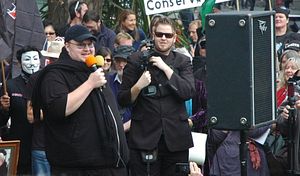The public debate that erupted in the wake of the Edward Snowden revelations about the very private collection of metadata and even more detailed records has not been limited to discussion of the activities of the U.S. National Security Agency: they have been a feature in Australia and New Zealand also. In Australia, it has been the current government’s policy on the retention of metadata, supposedly to combat homegrown terrorism, that has drawn criticism, especially because both the prime minister and the attorney general have had significant trouble explaining what metadata actually is.
In New Zealand, the latest political contender, German-Finnish internet tycoon Kim Dotcom, knows what metadata is. He also alleges that the New Zealand government under popular incumbent Prime Minister John Key of the center-right New Zealand National Party has engaged in mass surveillance of the citizenry in partnership with the NSA under the Five Eyes program. In the unlikely event Dotcom’s Internet Mana Party wins the election, he vows to “shut one of the eyes.”
Monday’s Moment of Truth event at the Auckland Town Hall in New Zealand, which The Guardian live-blogged, featured columnist Glenn Greenwald as a guest and live crosses to both Julian Assange and Edward Snowden. Snowden, who wrote on the New Zealand government’s surveillance for The Intercept, has said that when he was with the NSA he regularly looked over New Zealand citizens’ communications and that, “If you live in New Zealand you are being watched.” Key has denied such allegations whilst admitting that there was a certain measure of collusion with the U.S. before Wellington withdrew on concerns over privacy. Snowden and Dotcom suggest this is not the case at all.
The election is Saturday and its lead-up has already been tumultuous. Dotcom’s Internet Mana Party, which he founded and funded with several million dollars (reports have varied) is expected to pick up a couple of seats. As Dotcom (he changed his name from Schmitz to honor the dot.com bubble that made him so wealthy) is not a citizen he cannot run for office, but he has spoken at party events and is responsible for some of its platforms. The youth-oriented party, which has partnered with the Mana Movement, says it will cut the price of Internet access whilst combating surveillance, offer free education, and decriminalize marijuana.
Kim Dotcom started as a hacker in Germany and later moved to Hong Kong, where he founded hugely popular file-sharing site Megaupload in 2005. He then settled in New Zealand in 2010 where he quickly forged links with power brokers and politicians and donated to several charitable causes. He is currently fighting extradition to the United States on racketeering charges regarding Megaupload (which according to U.S. authorities cost artists and studios over $500 million in lost revenue) and spent a month in prison in 2012. He was released on non-monetary bail but his computers were seized and assets frozen – even his fleet of luxury cars was appropriated by the New Zealand authorities. Megaupload’s domain name was seized and other related sites were shut down by the United States Department of Justice, although the business restarted a year to the day later as Mega.
John Key has previously said he believes Dotcom’s party is simply a cynical move by the New Zealand resident to defy the extradition process. However, one candidate, Miriam Pierard, a 27-year-old high school teacher who apparently auditioned for her role, when interviewed by Australian broadcaster Triple J (part of the Australian Broadcasting Corporation) said that though Kim Dotcom was their founder he was no puppet master and the party was a serious one committed to faster, cheaper Internet and free education, as well as halting the surveillance of citizens. Although it is unlikely the new party will unseat Key (and one news report suggested its youth-oriented ideas have driven moderate voters towards the incumbent), the spying allegations will not go away no matter what the results of Saturday’s election.
Helen Clark was based in Hanoi for six years as a reporter and magazine editor. She has written for two dozen publications including The Diplomat (as Bridget O’Flaherty), Time, The Economist, the Asia Times Online and the Australian Associated Press.

































